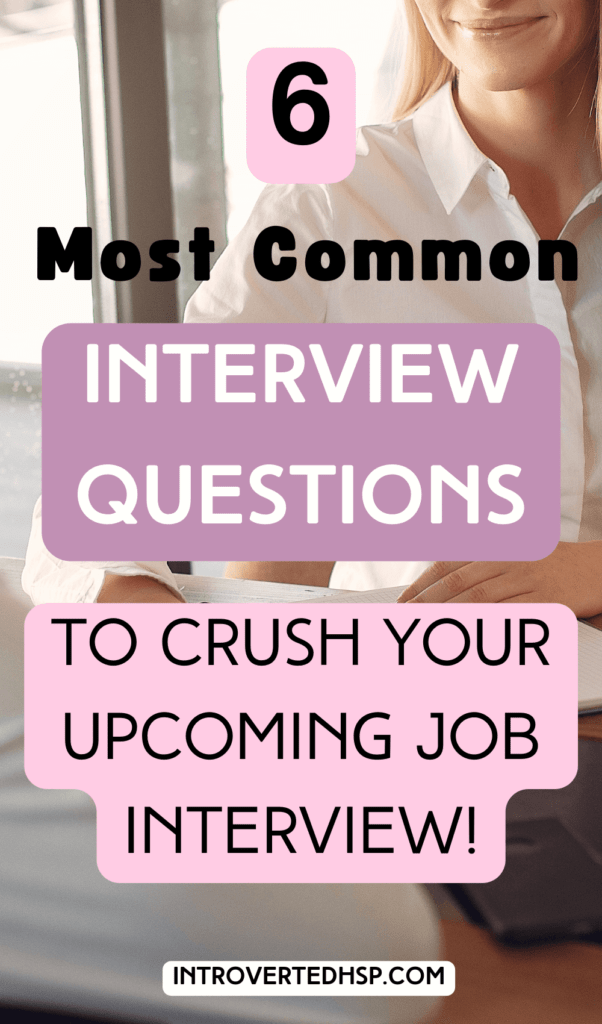When you don’t know how to prepare yourself for a job interview, because you have no clue what interview questions the recruiters or managers will ask you, keep reading.
I’ve gotten my fair share of job interviews in the past few months and hell was I prepared for them! I’ve read so many websites about interview preparation and watched tons of YouTube videos from real-life recruiters to know what I had to do to nail my job interviews.
So, I want to pass on my knowledge and what I have learned to help you prepare for your interviews the best you can.
Job hunting and interviewing is a daunting experience, especially if you struggle with social or performance anxiety, but it sucks for everyone and it’s a necessary evil if you want to find a job or change jobs when you are unhappy with your work life.
Don’t let the fear of job hunting stop you! Go after what you really want and prepare yourself with these 6 most important interview questions!

This post may contain affiliate links, which means if you make a purchase through these links, I may receive a small commission at no extra cost to you. As an Amazon Associate I earn from qualifying purchases. Please read my disclosure for more info.
Job Interview Preparation
You didn’t get rejected by your CV and cover letter (yayy!) and got an invitation for the first round of interviews, congratulations!
The preparation for your interview starts with a lot of research and introspection, about the company and yourself.
The job description and company
Always save the job description somewhere on your laptop, when companies are no longer looking for applicants, they might remove the job description from their site. Without the job description and the requirements they ask for, it becomes a lot harder to prepare yourself to nail your interview.
You should also spend some time researching the company, looking for its mission statement and vision, and researching the type of work they do and why they do it. This will help you to compare your values to theirs and see if you are a good match with the company.
Know yourself
It’s also very important to know yourself. This sounds obvious and easy, but I found it more difficult than I would like to admit. You should know where you stand and what you bring to the table. Know your strengths, weaknesses, desires, goals, etc.
You have to sell yourself to a bunch of strangers and make you sound appealing to them without bragging. You can’t let your work speak for itself, because you haven’t worked there yet. You can however tell them about your biggest accomplishments at other companies to let them get to know you a bit better and show your value.
The 6 Most Important Interview Questions to Prepare For
1. Tell me about yourself

The ‘tell me about yourself’ question is usually the first one of the interview questions you will get asked.
It’s a very broad question that allows you to tell the recruiter about your education and work history and get to know you a bit better. Basically, you are talking the recruiter through your resume but in a story form. So try to make it as engaging as possible.
It should only be about your work and education history but some recruiters will ask you about what you like in your free time as well, to get to know you better as a person.
You can adjust it to the role you are applying for, by focusing most on the experiences you’ve had that match the job description.
Don’t make your answer too long (that’s why you should practice beforehand on the most important things to mention) but try to keep it concise and to the point by talking for a max of 3 minutes about yourself approximately.
2. Why do you want to work here?
The second very important question on this list of interview questions is the ‘why do you want to work here’ question. This question is asking about your motivation for the specific role and company.
Companies and recruiters want candidates to be very motivated for their specific position and company because when you can hire very motivated employees, chances are bigger that they are going to work harder and stay longer than employees who are just there for the paycheck.
This question is twofold. You can answer on why you want the specific job title and function, but you should also mention why you want to work for this specific company.
It’s also important to note that you shouldn’t focus on the benefits they are offering as reasons why you want to work somewhere (although that might be your reason), you should focus on why you would be motivated without the pay and benefits. What attracts you to this specific sector, job and the particular company?
Find intrinsic motivation to show to the company that you would love the role and you are much more likely to move forward in the interview rounds. If you don’t feel this way, but you need a job desperately, I would recommend faking it a little.
I personally hate that it is this way, that you should seem to be highly passionate about the job you are applying for these days to make a chance of getting hired. It’s not the reality for a lot of people, who just need money to get by and have a job they tolerate, but if you apply with this attitude, you probably won’t get the job.
3. What are 3 strengths and 3 weaknesses of you?
Interview questions can be tricky. It’s prepping yourself to answer with the things you think the recruiter wants to hear if you want to get hired.
Talking about your strengths and weaknesses is also a double-edged sword. You don’t want to come across as cocky, but you also want to portray yourself as the best candidate ever.
If you can’t come up with enough good qualities, Indeed has a great list of 62 positive working qualities you can pick from. Pick the ones that are truly great qualities of yours and be prepared to explain them while using a real-life situation (preferably in the workplace). Always keep the job description in the back of your mind to pick the qualities that you can use for this particular role.
The weaknesses are where it becomes more tricky. Interview questions aren’t meant to be easy and this is dangerous territory. Most people know a lot of their flaws, but you shouldn’t flaunt them all to your possible next employer. Try to find weaknesses that have a positive side to them or show the interviewer how you are actively working on them to be better.
4. Why would you be a good fit for this role?

Why should a company hire you? What do you bring to the table? How are you going to benefit the company?
With this question, it is necessary to match your qualities and skills to the requirements in the job description. Make it the best match you can, try to convince the recruiter that you have every skill you need to do a great job and they would be crazy not to hire you.
If you don’t have every skill required in the job description, you can either choose not to focus on those or explain how you would upgrade your skills.
To answer this question in a good way, you should understand what is expected from you in this job. When you are still questioning what the specific task is that you would be doing, ask the recruiter to explain the role in more detail for you so you know what you are applying for and how you can be the best match.
5. Why are you changing jobs?
With all interview questions, you shouldn’t be afraid of telling a few white lies. I hate lying and being dishonest with people, but honesty doesn’t get you far when it comes to job interviews, unfortunately.
When you are sharing the reasons you are leaving another job, you should think about what reasons won’t hurt the new opportunity. It’s a no-go to speak badly about your former supervisor or team because this doesn’t reflect good loyalty and you might look like a difficult person.
You could talk about wanting to grow, learn new things, and progress in your career when you are looking for a similar job to your previous one. Talk about how much you love this company and always wanted to work for them. It could also be about wanting a job closer to home or knowing someone who works there and loves it over there.
If you are changing jobs into a different sector or job type because you hate the type of job you are doing or are sick of the sector, you could say that you are looking for a great fit with your work preferences and that you didn’t have this before.
The opposite of wanting growth and more challenge is looking for a more stable job with good hours to support your family better, to achieve a better work-life balance for example. That’s a pretty good reason to change jobs, but don’t make it sound like you want an easy laid-back job. Every employer wants driven employees.
Try to make it into a positive, focus on why you want a new job more than why you hated your old one.
6. Where do you see yourself in 5 years or the future?
The answer to this question should only be about your professional self, leave your personal dreams and ambitions at home.
Companies want to hear that you see yourself still employed at their company and it won’t hurt to also show your ambition for growth and that you would want to take on more responsibilities.
You could answer this question with that you would love to become an expert in the field and are the person whom people come to for advice, taking on a mentor role if you will. Maybe you want to be in a leadership position after getting to know everything in the company, that’s also a great show of ambition.
If you don’t want any of these things, you could tell them with the experience you build, you would like to take on more complex cases and be of greater value to the company without any leadership ambitions.
The most important thing to focus on is that you are there for the long haul and that you are willing to grow and keep learning to be a great member of the team.
More interview questions?

Of course, there are more interview questions you can prepare yourself for, but the ones I shared above are very common and should be prepared for every job interview.
Another type of interview question that is often used at interviews is behavioral questions. With these behavioral interview questions, the recruiter or manager is trying to get to know how you handle certain situations.
Behavioral questions are questions like ‘Tell me about a situation and your reaction’:
- when a customer was rude to you
- when you didn’t agree with your supervisor
- when you had tight deadlines
- when you make a mistake
- when you had to deal with something unexpected
- when you had a conflict with a coworker
- when you had to take charge
There are infinite questions to add to this list, but you can’t prepare yourself for every single one of them.
Conclusion
There is a very thin line between being well-prepared and over-preparing yourself. The second one could lead to more stress and at a certain point you just trust yourself and the fact that you did the best you could.
If you are truly a great candidate for the role and you practice the questions mentioned above, you should be fine.
You always need a little bit of luck as well if they are a lot of other great candidates. Don’t get discouraged if you don’t get the job, just keep going.
I wish you all the best with job hunting and hope you get the role you want as soon as possible!
Please share your interview experience below to help others with their job hunt. I would really love to hear about it as well. Good luck!
